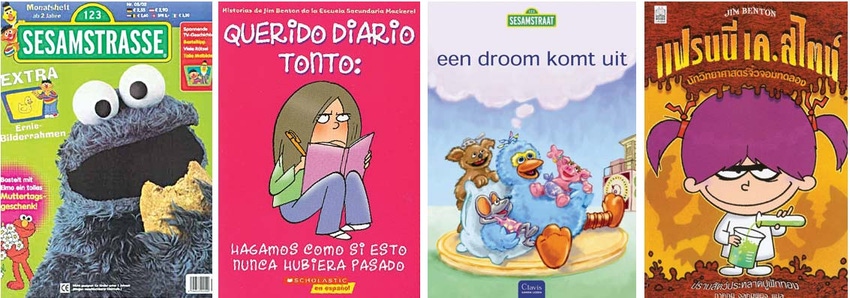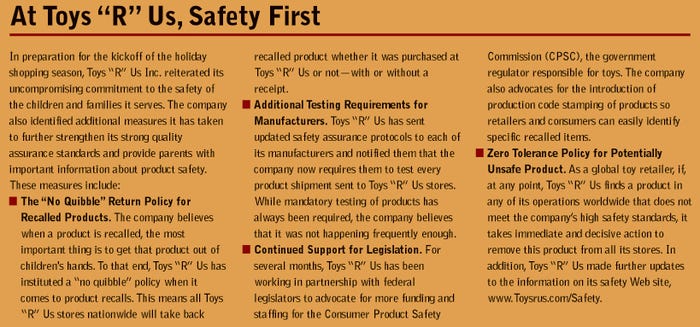Massive toy recalls have rocked the industry this year—but is some good coming out of the bad? The screaming headlines this fall were enough to send shivers through the whole industry—another toy recall had hi
April 6, 2018

Massive toy recalls have rocked the industry this year—but is some good coming out of the bad?
The screaming headlines this fall were enough to send shivers through the whole industry—another toy recall had hit and while Mattel was the name on every consumer journalist's lips, nerves were fraught for everyone—from manufacturers to retailers to consumers. So far this year, the U.S. Consumer Product Safety Commission has had 72 toy recalls, most because of high levels of lead. And if lead poisoning weren't scary enough, Aqua Dots toy beads, distributed by Spin Master Ltd. in the United States, but made in China, were recalled in November after two children who swallowed the dots hallucinated and were hospitalized.
The sales figures from the Christmas selling period will be key to knowing whether consumer confidence in the toy industry has been damaged by these events, but for Mattel at least, the company's quick mea culpa has been commended by its licensors, its competitors—no doubt breathing a sigh of relief—and even the press.
The CEO's up-front statement—now on all Mattel's Web sites—and the open international press conference put safety right back on the agenda. Sarah Allen, public relations for Mattel UK, was one of those at the center of the storm over the past few months.
"Every country has its own PR team. We were given all the facts from the U.S. and were then able to localize for our own markets, but with central coordination we were able to give a consistent message worldwide. Consumers recognized that we were doing the right thing, as we dealt with their enquiries quickly and efficiently. They were reassured," Allen says.
"It's too early to say whether sales will be affected—it doesn't seem to have done so yet, but we'll be looking at the Christmas numbers carefully."
Allen points out that two separate issues collided in the recalls—the issue of lead in paint and that of loose magnets. One was a manufacturing problem, the other a design problem.
In response, Mattel has put in place a new three-level safety procedure that includes testing paint for lead before it's used and, importantly, a ban on all outsourcing by its subcontractors. Chairman and CEO Robert Eckert has taken personal responsibility for the issue and has also created a new division of the business to cover corporate responsibility.
The recalls have had the consequence of raising awareness throughout the industry of safety—and the need, despite toys being safer than they have ever been, to reassure consumers.
The effect on license holders has been limited, with Mattel and Fisher-Price taking most of the heat. Disney was a fast mover in coming out publicly with random tests on its brands at retail, combined with audits of its licensees' factories. Disney stated at the time: "Product safety is of primary importance to Disney. We require all licensed producers of products using Disney characters to comply with all applicable product safety laws and standards and to test their products to make sure of their compliance. In addition to this, we not only demand to see the results of the safety tests that our licensees perform, but now also conduct our own testing of toys featuring Disney characters, including random testing of products already on store shelves."
None of BBC Worldwide's brands have been affected by recalls, but it is an issue that the company takes seriously, according to Gill Pritchard, director of children's within BBC Worldwide's home entertainment business. "All our lines are independently batch tested at the factory for compliance with European Union regulations, and we receive certificates for this. In addition, we do our own spot checks on toys already on sale. We know retailers are also checking. The recalls have raised the importance of such testing. Every factory across all our licensees has an annual audit—a detailed health and safety check of the process." 

Pritchard adds, "If there was an industry-led collaboration, that could only be a good thing and we would be keen to participate. We're talking all the time to licensees. The level of scrutiny is high-it's a real priority."
Global Awareness
There are both national and international initiatives following the major recalls this year. The British Toy and Hobby Association has, for example, set up a parent's page for reassurance on safety. Natasha Crookes, director of communications for the BTHA, says that recalls are part of the safety process, that toys are safer than they have ever been in the past, and that Chinese authorities are also tightening their processes.
Internationally, this year's scares have propelled industry bodies to take a serious look at the issue. Toy Industries of Europe is in talks with Toy Industries of America, the American National Standards Institute, the U.S. Consumer Products Safety Commission, and the European Commission to produce a workable internationally agreed upon audit system for the safety processes that manufacturers use. Chairman Bryan Ellis says the timeline is at least two years. "This is a serious and genuine attempt to create a global standard. The industry takes this issue very seriously," Ellis adds.
Nickelodeon's Dora the Explorer was caught up in the recalls through its Fisher-Price licensee. Jean-Philipe Randisi, senior vice president and managing director EMEA, Nickelodeon, says, "We have been affected through Fisher-Price, but Mattel has been effectively communicating. The manufacturing process in the Far East relies on chains of contractors and subcontractors, and that makes controls extraordinarily complicated. Retailers are checking, but we want a level of control before product hits the shelves. We aim to get visibility on the manufacturing, so we are asking our licensees to update their processes and we are putting in place an audit team to check the manufacturing process and quality of products using our properties."
The fact remains that toys are safer than they have ever been. The Mattel recalls were, after all, the result of supplier caution rather than consumer complaints. But children are precious and toy safety is always emotive—the industry is right to respond to the headlines and demonstrate to consumers that the issue is serious and taken seriously.
You May Also Like






